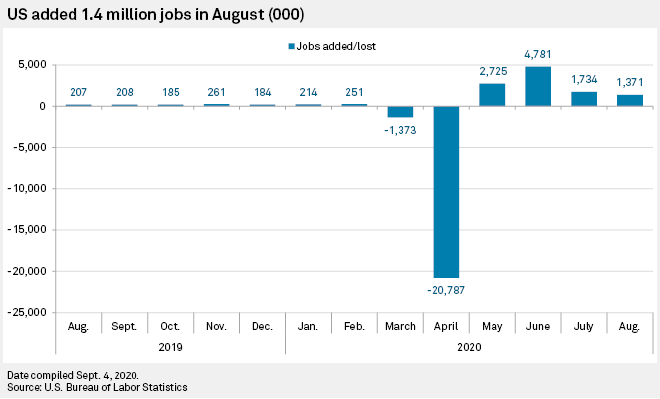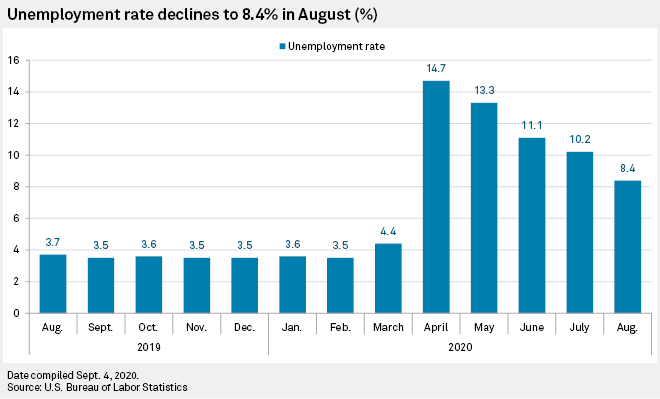Though the U.S. gained a historically high number of jobs in August, the 1.37 million additions marked a further slowing of hiring since widespread reopenings began in June, and economists worry that the momentum could die out without more federal stimulus.
The August report was driven by gains in government (344,000), retail trade (249,000), and leisure and hospitality (174,000), according to the U.S. Bureau of Labor Statistics, and brought the unemployment rate down to 8.4% from 10.2%, the first time it has been in single digits since March. In February, the rate stood at 3.5%.
"My worry is that this is a good report, but lawmakers still have a long ways to go," Beth Ann Bovino, U.S. Chief Economist for S&P Global Ratings, said in an interview. "I'm worried they may leave the operating table while the patient is still recovering."
Though an astronomical figure by historical standards, the August report was a marked slowdown from July, when 1.76 million U.S. jobs were added, and the record-setting June, in which 4.8 million jobs were added.

"There's not as much of a punch in terms of rehiring after the opening of stores and indoor dining in many states. It's more of a gym here and there," Sarah House, a director and senior economist for Wells Fargo Securities, said in an interview, adding that the job gains in August resemble "somewhat more normal patterns."
With the economy 11.5 million jobs short of the pre-pandemic level and 13.6 million people officially unemployed — 25% of them classified as permanent job losers — further legislative relief is needed, Bovino said.
She said she is watching how fast the permanent job losses pile up after many of the initial job cuts in the pandemic were categorized as temporary furloughs. The number of permanent job losers increased by 534,000 in August, to 3.4 million. More than 2 million people have been added to the ranks of permanent job losers since February, according to the BLS. The agency defines this group as "people whose employment ended involuntarily." Those on temporary layoff decreased by 3.1 million in August to 6.2 million, after the measure peaked at 18.1 million in April.

Lawmakers remain at odds over another potential relief bill due to differences over the size and cost of the legislation, with much of the debate pivoting on the resumption of additional federal unemployment insurance benefits.
No federal relief bill has been passed since the CARES Act was signed into law by President Donald Trump in late March, providing $2.2 trillion of relief including $600 weekly federal unemployment payments on top of state payments. These benefits expired without renewal at the end of July, with many Republicans saying the $600 weekly checks disincentivized people from returning to work for less than they collected while unemployed.
President Donald Trump in July signed an executive order that provides a $400 weekly unemployment boost, though the federal government provides just 75% of that figure. The federal money comes from Federal Emergency Management Agency funds, so it is limited by the size and other commitments of the agency's disaster relief fund.
Without a new stimulus to keep businesses open, rehiring could dry up, especially as health experts caution that the U.S. could be in for a challenging fall should coronavirus cases tick upward alongside the seasonal flu, House said.
"What happens with fiscal stimulus will be important here," House said. "Some companies may not be able to go on current employment levels. If we don't get the next fiscal package soon, that's going to weigh on activity and influence hiring."
- Author
- Evan Fallor
- Theme
- Macroeconomics



